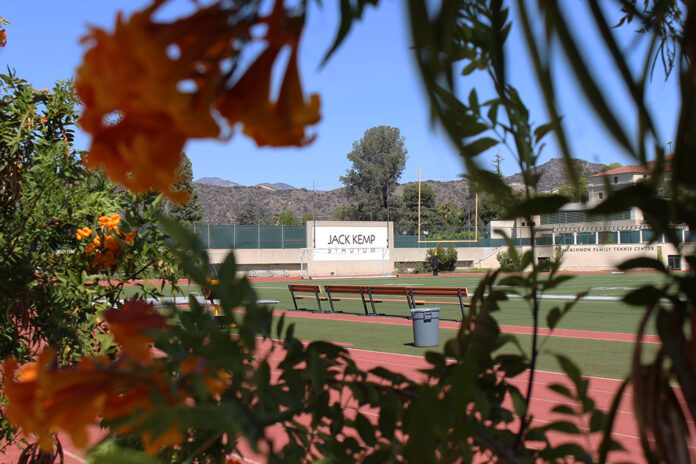
Occidental College Athletics participated in the NCAA Diversity and Inclusion Week Oct. 19–21. This social media campaign featured three different themed days to bring awareness to inclusivity within college sports, which the Occidental Justice Equity Diversity and Inclusion (JEDI) committee and Student Athletic Advisory Committee (SAAC) organized for the college.
Dominic Rios (junior), a member of men’s water polo and JEDI, said NCAA Diversity and Inclusion Week is important because identities are a huge part of people’s lives and can often be overshadowed — especially within sports.
“Oftentimes there is this feeling of being an outsider and an outcast. I don’t fully know where I fit in with my team’s cultural identity because I’m not white and I’m not straight,” Rios said.
According to Rios, SAAC collaborated with JEDI to create different videos and images for each day’s theme.
Kulaea Tulua (senior), a member of women’s basketball and social media chair for SAAC, said she was involved with organizing NCAA Diversity and Inclusion Week.
“This week is all about acknowledging identities, acknowledging privilege and trying to raise the voices of athletes in white-dominated sports,” Tulua said.
On the first day of the campaign, titled “My Voice, My Platform,” student athletes were asked to submit individual videos to explore their identities, experiences and perspectives, according to Tulua. Tulua said she then compiled them into one video to post on social media.
According to Tulua, interacting with the content and acknowledging the work that goes into it is important for advancing and bringing awareness to these important issues.
“It takes time to make these videos and a sense of vulnerability for people who make these videos to share their identities and experiences,” Tulua said.
According to Rios, JEDI was in charge of the second day of the campaign, titled “Championing Change.” Members of JEDI shared how they are pushing for a more inclusive environment, both within their respective teams and at institutional levels within the college.
Tulua said that on the third day of the campaign — titled “Belonging Is…” — she and her teammate Clarissa Kiyomura (senior) set up a table in the quad for student athletes to write what belonging means to them. SAAC and JEDI shared the images on their social media to highlight all the different ways that students can feel like they belong. Students wrote that belonging is “trust, acceptance, understanding, advocacy,” “feeling accepted for my interests and identities” and “feeling at home with your team.”
Tulua said after the campaign is done, she wants privileged people to continue holding themselves accountable, not just in terms of race but many other identities like being cisgender, heterosexual, able-bodied and more.
“Diversity and inclusion goes way beyond one week and I’d really like to see people continue to uplift students of marginalized identities,” Tulua said.
Ariel Lashinsky (sophomore) is a member of the softball team and the JEDI committee. Lashinsky said NCAA Diversity and Inclusion Week is an integral part of highlighting what colleges across the country are doing to foster an inclusive community for their athletes.
“It’s important for me to see other identities being represented on my team even if it’s not my own [identity] and that we’re doing work to make sure we’re not just recruiting one type of person,” Lashinsky said.
Tulua said that, as someone who identifies as a Pacific Islander — specifically Tongan — she has enjoyed having a space where people can ask her about her identity and she gets to share things about her culture.
“I don’t know many other Pacific Islanders on campus,” Tulua said. “It’s really cool to be asked questions about what identities I hold and how that pushes me forward as a person and as an athlete.”
According to Lashinksy, JEDI has scheduled workshops with Occidental athletic programs to address diversity-related issues and normalize talking about identities in athletics.
“Conversations are great but then conversations need to spark change to actually make a difference in team culture,” Lashinsky said.
Lashinsky said she would like to see privileged communities acknowledge their privilege but also have programs to create more safe and accepting environments for all students.
Rios said he would really like to see the Occidental community as a whole change their word usage to be more inclusive of all identities, specifically sexist and homophobic phrases that are often used in athletics.
According to Rios, sports can perpetuate many harmful practices, like toxic masculinity and offensive jokes which hurt marginalized communities. Rios said he wants people of privileged backgrounds to help create positive change.
“Even though this is only a three–day social media campaign, it’s a constant ongoing fight and uphill battle,” Rios said. “To certain people it may feel like it stops, but to those really fighting, it’s an everyday battle to try to make marginalized people feel more included, seen, heard and valued.”
![]()






























